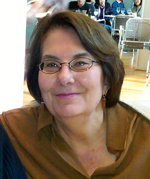 My Aesthetic Realism Consultations
My Aesthetic Realism Consultations
by Richita Anderson
Richita Anderson is past president of the New York City chapter of the International Association of Workforce Professionals.
When I asked to have consultations, I did so because I knew that in Aesthetic Realism there was knowledge that was new, was kind, and had a logic far beyond anything I had met before, either in college or in the extensive reading I had done. Aesthetic Realism explained a hope I didn’t even know I had: to like the world. It also explained where my pain came from: my desire to have contempt, to feel superior to people and things.
I thought my pain came from other people’s unkindness. Seeing the anguish in my parents’ marriage and in other people’s lives, I decided that the way to be safe was to be separate from others and try not to feel much about anything. But I succeeded too well. Everything seemed pretty flat. And I found myself hard while also feeling I was too wishy-washy. I hoped that someone would break through the wall I had so carefully built around myself, which now kept me stuck inside myself.
Through Aesthetic Realism consultations I changed from an inward, timid, severe person to a hopeful and kinder woman. My consultants taught me that “The world, art, and self explain each other: each is the aesthetic oneness of opposites.” They said to me, “Look at the principles and you’ll see how true Aesthetic Realism is. The opposites are everywhere. They are the structure of everything, including you. Once you see this, you’ll feel more connected.”
To make this clear, they asked me to describe an object I had seen that day. I said, about a small bowl, “It’s orangish brown, about four inches in diameter, shallow, made of pottery, circular.” My consultants asked, “Are you talking of opposites? Dark and bright? Does depth put together up and down? It is pottery, hard; and it is circular, which is softer. How would you describe yourself?” “As too hard.” “Do you also think you’re a softy?” I answered yes, and they said, “You talk softly. Could someone only hard talk so softly? Do you talk softly to counteract the feeling of hardness inside?”
I felt that these Aesthetic Realism teachers really understood what I felt to myself but had never told anyone, as they asked me, “Did you think you were born the wrong kind of person?” They taught me to see the world as friendly through the structure of opposites in objects and also in other people, and as I saw this I liked myself more.
Contempt Makes Us Lonely
While I acted shy, I also felt superior to other people. I was asked in my first Aesthetic Realism consultation, “Have you felt very lonely?” When I said yes, my consultants explained, “The thing that makes you lonely is your desire to like the world, unfulfilled. So, do you think you’re more like other people or less like other people?”
RA. I think less like other people.
Consultants. Do you think that you would lose anything by seeing yourself as like other people?
RA. Yes.
To show me how much I wanted to see I was like other people, my consultants asked a question that surprised me: “Do you think your father had any deep hope?” I said, “He must have, I think.”
And they continued, “Do you think it’s the same deep hope you have? Do you hope right now to be known deeply? Does your father?” I had thought little about the depths of my father. I saw him and all men as very different from me. Then they asked me this beautiful question: “How many things do you think you are related to? We’re thinking of you now in relation to the Delaware River. There is something of a person in a river the way a river flows and remains the same; can seem still and be in motion; the way the water in a river puts together surface and depth. For example, do you think your father can be sitting in his office rather quietly and at the same time have a tumultuous train of thought?”
RA. Oh, yes.
Consultants. Do you have respect for that just because he has those opposites?
RA. Yes.
As I was learning how I was related to the world, I began to change. I no longer felt lonely; things began to have meaning for me; life was no longer flat. I stopped complaining so much.
What Is Humanity’s Dignity?
In my early consultations I would often say in one way or another that I didn’t want to be involved with things. I thought this was strong and smart. I had a sense of myself as dignified. When my consultants asked, “Do you think it’s weak to show emotion?” I said yes. They continued, “‘Dignity’ can be a disguise for conceit. If a person were really dignified, what would be present? Would there be a feeling of relation with other people, while the sense of oneself continued?” “Yes,” I said. And they asked, “Do you think a person’s dignity is in being able to feel and know the world outside oneself? Aesthetic Realism says, to be able to have emotion we are proud of is our dignity. So a person who did the most as to feeling and knowing would be the most dignified, not the person who was the coldest. If you saw you are going for a oneness of knowing and feeling, would you be less afraid?” “Yes,” I said, “I would.”
Aesthetic Realism is what every woman is hoping to know.